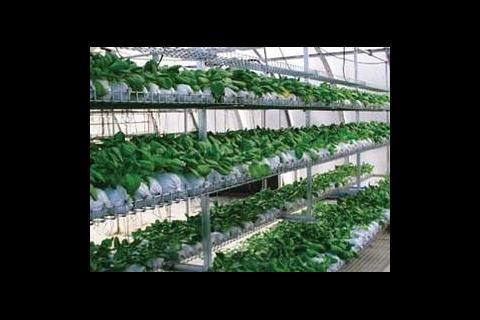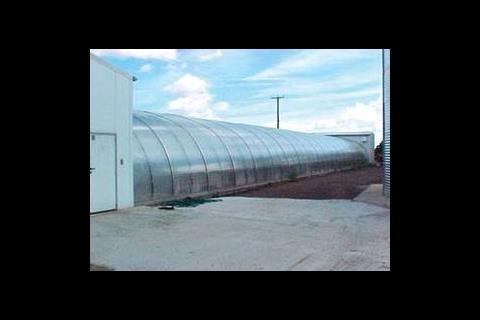Professor Bellamy is an advisor to the scheme and Greenpeace co-founder and former director Peter Wilkinson has carried out an environmental impact assessment.
Sealed twin-walled polycarbonate tunnels – GroDomes – house closely packed ranks of plants grown in the recycled coconut waste product coir, which can be recycled and reused several times. The design of the tunnels means 'exotic' produce such as the Chinese lettuce pak choi, chillies and strawberries can be grown all year round. And one hectare with seven growing tunnels can produce the equivalent of 40 hectares using conventional farming techniques because of the planting densities the tunnels can sustain.
Supermarkets and restaurants report a rapidly growing demand for many types of fruit and vegetables that are difficult to grow in the UK climate – forcing suppliers to fly them in from around the world. This incurs excessive 'food miles', a factor which has become a serious concern in recent years. Unigro aims to redress the environmental balance by meeting consumer demand closer to home, without the use of pesticides. Fresh produce can be taken from the tunnels to the shops within 24 hours as opposed to the five days it normally takes to bring similar items in from the Far East.
The Greengro secret lies in the internal environment created within the sealed tunnels with temperature, humidity and CO2 levels controlled to allow up to eight crops of the chosen produce a year. Computer software monitors and controls light levels, the automatic irrigation system and regulates humidity depending on the crop requirements.
A prototype dome built at Chimhams Farm near Brands Hatch in Kent is, at 420 m2, the largest sealed controlled environment room available in the world for this kind of research and production. However, Unigro plans to build many of these tunnels in various locations and has received planning permission for as many as 60 tunnels on the Isle of Wight, at Ockenden in Essex, as well as at Brands Hatch.
Farmers taking a tunnel will be expected to return 0·4 hectares of their conventional farmland to nature as part of the biodiversity improvement behind the scheme. The National Farmers Union is said to be very supportive.
Internal climate
The rigid and resilient double skin polycarbonate structure interacts with control software and external conditions to maintain the required internal climate, while maximising natural irradiance. An undivided growing room gives an energy saving of up to 40% when compared to standard chambers and the whole system is highly water conservative.
The GroDome is designed for programmable climate synthesis that can be consistently reproduced. The climate simulation system dissipates heat from solar gain without the need for air exchange or ventilation. This provides three benefits:
- Gaseous concentration: uninterrupted manipulation and pressure control.
- Containment: level II-IV security for transgenic or clean room applications.
- Environmental manipulation: to quickly change the climate for stimuli exploitation.
Uniform conditions throughout the vertical plain allow the room volume to be fully exploited with bespoke racking or benching depending on what it is being used for.
PAR sensitive supplementary lighting and photoperiodic control with an internal blind system maintain these conditions – full irradiance specifications are available.
Humidity control is held between 45% and 95% rh over a broad temperature range implementing pathogenic fungal control. The temperature can be controlled to within 1·5°C.
Continual monitoring of the internal and external shell casing parameters is carried out for triple containment and emergency fumigation without exposure as is variable control of the atmospheric constituents, pressure and air movement. The control software includes remote alarm and reporting.
Air conditioning specialist Denco was asked by Unigro to help with the development of the climate control system. "The heat gain experienced by the tunnels, particularly in the summer, and the need for total environmental control makes this one of the most complex, but also rewarding projects we have taken on," says Denco's technical manager Tony Watkins.
"Also, we could not simply throw technology at the problem. The nature of the project meant we needed to apply the strictest possible environmental criteria to any solution."
Heat gain
The result was a 'back to the drawing board' approach with a prototype cooling system developed in Denco's Hereford factory. A 26 kW chiller producing chilled water that serves cooling coils positioned around the 42 m long tunnel delivers the equivalent of 80 kW cooling because of large built-in storage capacity. Tandem scroll compressors are used in the chiller to deliver an attractive coefficient of performance and electricity consumption is further reduced by running the system at night to top up the stored coolth, which can be released during daylight hours.
Aquacells, that store the water under the tunnel floor, also provide up to seven hours of supplementary cooling in the summer. In installations where there is a need to heat additional processes, rejected heat from the cooling process is also absorbed by the water store so avoiding the need for dry heat rejection and providing an energy free source of warm water for top-up heating in winter.
However, the need for supplementary heating in the tunnels is rare as heat gain is intense, even in cold weather - extra heating to keep the crops warm was only required for about seven hours over the whole of last winter. Air is trapped between the two layers of polycarbonate skin so providing highly efficient insulation. When the cooling system is switched off for servicing the temperature will rise to over 42°C inside the tunnel in less than an hour.
Internal and external sensors determine lighting and CO2 levels, key elements in the growth process. Each of the fan coil units contains two axial fans and coils specially treated with a hydrophilic coating so that water runs away quickly from the coil after dehumidification to avoid excess moisture remaining in the air and unbalancing the closely controlled rh.
"We built a new packaged chiller for this project," explains Watkins. "It contains all the pumps, compressors and plate heat exchangers. We also opted for non-ozone depleting refrigerant 134a."
The refrigerant is contained within a fully sealed unit so that the installation team has no reason to come into contact with it and because 134a is a single module refrigerant there is no problem with temperature glide, which can affect system performance.
"There is further scope to improve the environmental criteria of this system in the future by developing a hydrocarbon refrigerant version," says Watkins. "A packaged system used in a largely unoccupied area like this lends itself well to the use of hydrocarbons, which have minimal global warming potential as well as zero ozone depletion – that's the next step for this technology and would provide the complete environmental solution."
Campaigners
The Government and environmental campaigners are looking towards the building services community to deliver sustainable engineering solutions. So this collaboration between organic farming and air conditioning innovators is already being hailed as an example of this thinking in action.
The system can be used in virtually any climate because Unigro's thermodynamic software provides modelling of bespoke designs for the thermal load calculations enabling running costs to be calculated for all external conditions. The company has also developed a continuous flow, high volume steam sterilisation/pasteurisation system. Temperatures and pressures exceeding the thermal death points of resistant pathogens are created for growth substrates without the risk of chemical toxicity, fuel contamination or burning.
The tunnels can be divided into a number of growing chambers so various research projects or plant types can be catered for simultaneously with their own self-contained mini-climates. The partitions can be moved easily and the software reprogrammed to cope.
Denco has committed itself further to this particular innovation by renting office space from Unigro on the farm. "It is a logical step forward for both organisations," explains Denco managing director Mark Shutler. "We needed a presence in the South of the country, but we also want to be close to the action as this exciting farming technique evolves."
"Denco's technical skill has enabled us to build a unique product. This technological advance has major implications for the fresh produce industry while also being a safe reliable tool for contained horticultural research," Unigro added.
Source
Building Sustainable Design
Postscript
For more information contact: Mark Shutler, Denco Air Conditioning, PO Box 11, Holmer Road, Hereford, HR4 9SJ. Tel: 01432 277277
























No comments yet